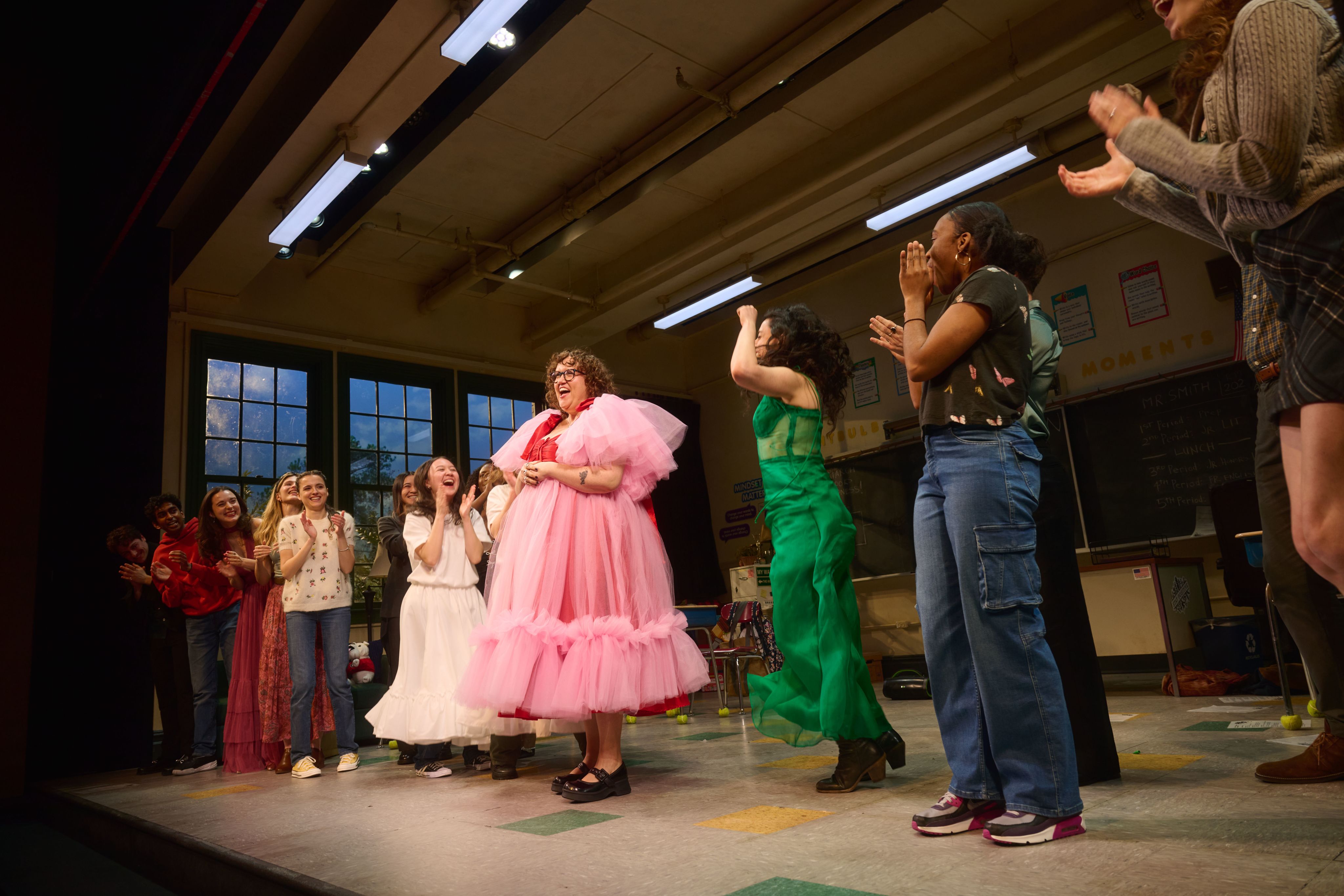LESSONS LEARNED FROM A SEASON ON BROADWAY
A Q&A WITH KIMBERLY BELFLOWER

To call this a whirlwind year for playwright Kimberly Belflower would be an understatement.
In the fall of 2024, the Emory playwright flew to New York for auditions and pre-production for “John Proctor is the Villain” after “Stranger Things” actor Sadie Sink fell in love with the script and championed its run on Broadway.
Set in 2018 in a small town in Georgia, the work follows a group of high-school students assigned to read “The Crucible” by Arthur Miller. The situation escalates when they start to notice connections among events in their own lives and the burgeoning #MeToo movement, as well as the Salem witch trials described in Miller’s play.
But flying to New York for auditions, rehearsals and the play’s debut was just the beginning for Belflower, assistant professor of dramatic writing in Theater Studies and the Creative Writing Program.
Some plays prompt a buzz. “John Proctor” generated a cultural clamor.
In addition to rave reviews, the play netted two Drama Desk wins: Outstanding Direction for Danya Taymor and Outstanding Featured Performance for Amalia Yoo. The play also won two Outer Critics Circle Awards: for Outstanding New Broadway Play, and Outstanding Direction, for Taymor. And the play earned seven Tony nominations, including Best Play and Best Leading Actress, although it ultimately did not take home a Tony.
After its April 14 opening, demand prompted the show to keep extending its run; recently, Chiara Aurelia took over Sink’s role as Sink began production on a Marvel movie.
Universal Pictures recently optioned the play for a film that Sink will executive produce. Tina Fey, best known for starring in, creating and producing “30 Rock,” and writing both the original "Mean Girls" and the 2024 remake, will be one of the movie’s producers.
The day Belflower sat down to talk at a coffee shop in New York’s Hell’s Kitchen neighborhood, she admitted to having hardly slept, after yet another life dream came true.
Singer-songwriter Lorde, whose song “Green Light” is featured in “John Proctor,” had come to see the play the night before and visited backstage afterwards. “And I just kept waking up and reliving it,” said Belflower.
Even sleep deprived, Belflower was happy to talk about the thrills of her first season of Broadway success and what she’ll bring back to her students from the experience.
Image: The show’s director, Danya Taymor, and Belflower stride down the red carpet outside the Tony Awards, beaming at the photographer — Belflower’s father, George Belflower. Photo courtesy of Kimberly Belflower.
"There is no play without her song," says Belflower of "Green Light" by Lorde, shown here signing autographs for theatergoers. Photo by Michaelah Reynolds.
"There is no play without her song," says Belflower of "Green Light" by Lorde, shown here signing autographs for theatergoers. Photo by Michaelah Reynolds.
The curtain of “John Proctor is the Villain” at Booth Theatre, before showtime. Photo by Kate Sweeney.
The curtain of “John Proctor is the Villain” at Booth Theatre, before showtime. Photo by Kate Sweeney.
Sadie Sink exchanges a smile with fellow cast members following her final lead performance. Photo by Michaelah Reynolds.
Sadie Sink exchanges a smile with fellow cast members following her final lead performance. Photo by Michaelah Reynolds.
Director Danya Taymor and Belflower backstage on opening night. Photo by Michaelah Reynolds.
Director Danya Taymor and Belflower backstage on opening night. Photo by Michaelah Reynolds.
Let’s start with Lorde. Her song comes in at the play’s climactic moment. What was it like to have her there, visiting with you and the cast?
Belflower: Okay, so I’ve been working on this play for seven years. And her song has always ended the show; always. There is no play without her song. She’s so important to me, and it was tremendous to have her to watch the art that needed her art to exist. We met and talked and hugged and clutched hands. Then, she came out and did the stage door [signing autographs for fans] with the actors! So, some lucky fans got autographs from Lorde!
It’s been a whirlwind. And that was, like, a whirlwind on top of a whirlwind. Just before this conversation, I came from rehearsal with Chiara. We’re sad to say goodbye to Sadie, but also really happy that the play gets to have an extension, and this is a signal to other markets for the play, that it truly works with a variety of actors.
This was your Broadway debut. Catch us up on what that’s been like.
Belflower: I feel like I have lived 10 different lives this spring. I was on sabbatical from Emory. We started rehearsals. And then we started previews in March. So, we had the experience of arriving at the point where it was, like, “Oh, I’m so proud of what we’ve made.” But then there was the anxiety around, “But are the critics going to like it? Is our audience going to show up?”
But then, the reviews were positive, and there was word-of-mouth spreading. And that was exciting. But I feel like I didn’t really even get a chance to process that, because we opened April 14, and that was almost exactly two weeks before the Tony nominations were announced, right?
And once that happened, then it was just: the circus. Galas and luncheons and events and amazing dresses! And, like, yeah, magic, wonderful, amazing. But also, like, overwhelming and stressful. Our PR team made me a spreadsheet of all of the events and where I needed to be and what the dress code was.
So, there were these “pinch me” moments, and then also, “Oh, my god, I hate that picture of myself, but I am being photographed so much, and I don’t know what to do with my hands!”
Can we come back to the dresses for a moment?
Belflower: I had to buy so many clothes! I wear dresses a lot in my normal life, but they wouldn’t be appropriate for, like, the Drama Desk Awards, you know? There was a day when I ran into Gabe Ebert, who plays Mr. Smith in the play; he was nominated for a Tony [for Best Featured Actor] as well. So, I ran into him at a clothing boutique downtown, and he just kind of had this dazed expression in his eyes. And then he goes, “It’s expensive being a Tony nominee!”

Belflower poses for photos outside Broadway’s Booth Theater after learning her play received seven Tony nominations. Photo by Michaelah Reynolds.
Belflower poses for photos outside Broadway’s Booth Theater after learning her play received seven Tony nominations. Photo by Michaelah Reynolds.
Tell me more about what the whole Tony Awards rollercoaster was like.
Belflower: It was magical, but it’s also, like, I’m in a ballroom at, like, 11 a.m. in full glam — and I am never in full glam — eating a salad. And then I look over and there’s [Broadway stars] Sutton Foster and Idina Menzel.
So, it was so fun! And so exhausting! And I got to see so many friends I came up with. Taylor Trensch, he was an actor who was nominated this year in the Featured Actor in a Musical category. He was my roommate when I lived here when I was 23. And then Andrew Durand, who was nominated in the Leading Actor in a Musical category, lived a block away from us at that time and was in our friend group. And Cole Escola [who won a Tony for Best Actor], I’ve known since I was 23. So, it’s like, my heroes and my friends; the people I came up with.
Getting to share that experience with [the cast and crew of “John Proctor”], we call ourselves “The Coven,” was so meaningful; I’ll never forget it.
What of this experience will you bring back to your students?
Belflower: I feel strongly about letting them know that Broadway wasn’t the goal with this play. It wasn’t that I sat down and said, “I’m going to write something that’s going to be commercially viable and be produced on Broadway.”
This is, like, my dream production of this play. I’m so proud of it. But when I first started writing it, I didn’t have an agent. I was writing it for college students, and I thought that was going to be the play’s life, and that was going to be a great life.
I’m not wanting to downplay the enormity of this whole moment, because it is enormous. But there are other things that I will hopefully do in my career that will mean just as much, if not more, that won’t be this sparkly. The point has to be the art.
Fans queue up outside the stage door for autographs and photos after a performance of the play, which routinely sells out. Photo by Michaelah Reynolds.
Fans queue up outside the stage door for autographs and photos after a performance of the play, which routinely sells out. Photo by Michaelah Reynolds.
Earlier this year, you hosted a group of Emory theater students to come see “John Proctor” and you met with them afterwards. You also hosted students earlier in the semester, to watch rehearsals. Why is bringing your students into the Broadway environment important to you?
Belflower: I had two theater students come to observe rehearsals, and I asked them, “What did you learn this week? What were the surprises?” And they were surprised that it just felt like a normal rehearsal process.
And I remember, when I was in college as a theater major, it was still kind of inconceivable to me, how theater happens out in the world. It was like, “Oh, we make our plays at our school,” but theater in the “real world” felt like it must happen in, like, a hallowed hall that’s totally different from how we rehearsed.
And that honestly kind of still surprised me. I’ve been working professionally, but I did have some anticipatory anxiety around being on Broadway. But then we started doing it and I thought, “Oh yeah, I know how to be in rehearsal.”
And so, I wanted to let them see that the things you’re building at Emory are the things that you will continue to use in the world.
How does that translate to how you teach?
Belflower I’ll have them read one of my plays and talk through the journey of the play and rewrites I’ve made, and who I knew at the theater, and who advocated for me.
[As an undergraduate], I don’t think I had anybody who was working at this level who was letting me in on the process. In grad school, I did, and that was so amazing, and I’m so grateful. But then I thought, “Oh, man, if I had had that when I was 22 instead of 29, then maybe I could have figured out some things earlier.”
I was just so in awe of New York and [gestures grandly] “Theater!” when I was their age, and there’s so much good theater in so many places, so I want to open that door to them, and I want them to feel like they can be a part of it.
Following her final lead performance, Sadie Sink leans in for a hug from Belflower. Photo by Michaelah Reynolds.
Following her final lead performance, Sadie Sink leans in for a hug from Belflower. Photo by Michaelah Reynolds.
You spent most of your time in New York during this sabbatical. What do you look forward to about being back in Atlanta?
Belflower: So, being in New York in Tony season has been just crazy and magical, but teaching — I love it, and it’s a useful tether. Jericho Brown, [Pulitzer Prize-winning interim director of the Emory Creative Writing Program] put it really well. In talking about doing talks and events, he said, “Okay, this is fun, but after a while, it feels like you’re eating dessert for every meal.” That’s exactly how it feels.
And Atlanta is a quieter pace. I really value that. I love the South. There are cicadas! Lightning bugs. And it's green!
Director Danya Taymor and Belflower at the first rehearsal for “John Proctor is the Villain.” Photo by Jenny Anderson.
Director Danya Taymor and Belflower at the first rehearsal for “John Proctor is the Villain.” Photo by Jenny Anderson.
Speaking of eating your vegetables instead of only dessert, have you had a chance in recent months to sit down to write?
Belflower: I am working on this story about rural Appalachian women and art that’s kind of loosely inspired by my Great Aunt Betty and her daughter, Doris. I’ve also been working on a play that’s kind of a love story that’s also about the opioid epidemic in the South and disappearing small-town businesses.
The musician Lorde, onstage with Belflower following a performance of “John Proctor.” Photo by Michaelah Reynolds.
The musician Lorde, onstage with Belflower following a performance of “John Proctor.” Photo by Michaelah Reynolds.
What are you looking forward to this fall?
Belflower: I get to co-teach a class with my colleague, Caitlin Hargraves [assistant teaching professor and artistic director of Theater Emory], who’s one of my dear friends.
We have this class (“Creating New Works: Adaptation”) on devised theater, which is collaboratively made theater where we build the whole thing collectively from the ground up. It’s really fun. Our goal is, eventually, to maybe build something with the class to take to a fringe festival or something.
So, I’m looking forward to being back. Everybody’s been so lovely and so, so supportive. I have been at Emory for almost as long as I’ve been writing this play. Like, I started writing it in 2018 and I started at Emory in 2019, and so many people, from students to colleagues, have come to see the play, so just feeling that community and that lineage has been very, very special.
Cover images by: Amanda Qubty, Michaelah Reynolds, and Kimberly Belflower

‘IT WAS LIKE SEEING MY LIFE ONSTAGE:’ Emory students reflect on ‘John Proctor’

“If you’re a theater person at Emory, you know Kimberly Belflower,” says Tai Jackson, a senior majoring in theater studies and film and media.
Jackson was among six Emory students who were part of a Theater Studies trip to New York in May to see “John Proctor is the Villain.”
The students also spent time with Belflower there, dissecting the play’s mechanics.
“I mean, where else but Emory would I have the opportunity to fly to New York to see my professor — someone I see all the time in the halls of my theater building at school — at her successful play on Broadway?” quips Jackson.
Like Belflower, Jackson grew up in a small Georgia town. Watching a Broadway play that accurately depicts smalltown Southern life felt cathartic.
“It was like seeing my life onstage,” he says. “I mean, modern day, rural Georgia! Not many stories on stage or even on screen do that. By the end, I was just euphoric, with tears welling up because it felt like watching my friends going through something.”
The play's star, Sadie Sink, front and center, hops into a selfie with Emory visitors. Second row, from left: students Mackalee Cooper and Morgan Schatmeyer. Third row, from left, are: students Jane Minus and Andreanna Kitas; Charles Swint, Theater Emory marketing associate, and student Tai Jackson. Back row: Rosalind Staib, managing director of Theater Emory. Photo courtesy of Tai Jackson.
The play's star, Sadie Sink, front and center, hops into a selfie with Emory visitors. Second row, from left: students Mackalee Cooper and Morgan Schatmeyer. Third row, from left, are: students Jane Minus and Andreanna Kitas; Charles Swint, Theater Emory marketing associate, and student Tai Jackson. Back row: Rosalind Staib, managing director of Theater Emory. Photo courtesy of Tai Jackson.
Seeing the play has emboldened Jackson, who never thought of himself as a playwright, to try his own hand at penning a play.
The realism in “John Proctor” also struck a chord with Morgan Schatmeyer, a junior majoring in theater studies and film and media studies, and part of the May student trip.
Emory students visited Broadway's Booth Theatre in May to see the play and discuss it with Belflower. Front row, from left: Rosalind Staib, Jane Minus, Andreanna Kitas, Bellflower and Michael Evenden. Back row, from left: Charles Swint, Tai Jackson, Mackalee Cooper, Noah Liam and Morgan Schatmeyer. Photo courtesy of Tai Jackson.
Emory students visited Broadway's Booth Theatre in May to see the play and discuss it with Belflower. Front row, from left: Rosalind Staib, Jane Minus, Andreanna Kitas, Bellflower and Michael Evenden. Back row, from left: Charles Swint, Tai Jackson, Mackalee Cooper, Noah Liam and Morgan Schatmeyer. Photo courtesy of Tai Jackson.
“I just think there’s never been anything like it before onstage,” she says, pointing to the play’s lifelike dialogue. “Like, that is what my friends and I actually sound like when we talk. And it just made me feel so empowered as a teenage girl myself.”
“That’s, like, all I ever want to do,” says Belflower, reacting to this praise, “and it’s so meaningful to hear it reflected back. I mean, I was a teenage girl with a Southern accent in a small town in Georgia, you know? And, like, I felt like I had to get past that or become something else to be taken seriously.
“So, I want these students to know: ‘Your experience matters. Where you’re from matters, and what you have to say matters and how you have to say it matters.’ You don’t have to shoehorn what you have to say into a certain way of speaking. You can just say it how you want to say it.”
Schatmeyer says it’s been exciting to cheer on the success of an educator who cares so deeply about student work. “Kimberly is someone who attends every single show that we do. She came to the very first student production I was in, and I remember thinking, ‘Wow, this professor cares so much.’”
“She just has the warmest personality,” notes Jackson, “so kind and eager to let students know that this community is something special, and this program is worth being a part of.
“Emory is one of the few programs in the Southeast with such a strong playwrighting program, and Kimberly is part of the reason for that,” he adds.
It was community that made the difference to Schatmeyer, too. She recalls joining other students in Belflower’s “Contemporary Drama” class in a round of applause when they learned “John Proctor” was going to Broadway.
“She just invokes such a sense of pride in all of us,” Schatmeyer says. “She has so much heart. And I think that’s why this work resonates with so many people.”

Want to know more?
Please visit Emory News Center and Emory University.














